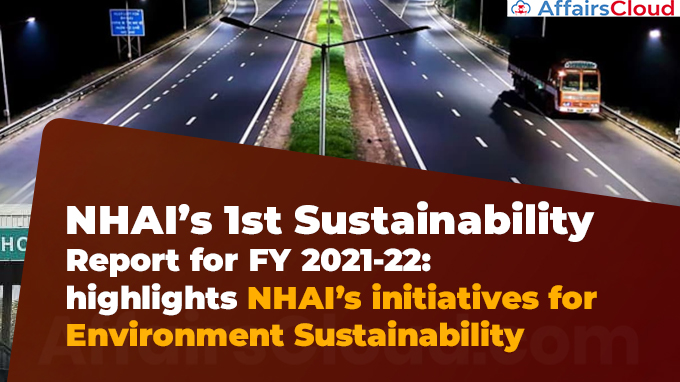 National Highways Authority of India (NHAI), under the Ministry of Road Transport and Highways (MoRTH), has published its inaugural ‘Sustainability Report for FY 2021–22: Building A Sustainable Road Infrastructure’, which highlights the effectiveness of various efforts undertaken by the NHAI toward the conservation of environment and energy.
National Highways Authority of India (NHAI), under the Ministry of Road Transport and Highways (MoRTH), has published its inaugural ‘Sustainability Report for FY 2021–22: Building A Sustainable Road Infrastructure’, which highlights the effectiveness of various efforts undertaken by the NHAI toward the conservation of environment and energy.
- The report, prepared as per the Global Reporting Initiative (GRI) reporting guidelines, was released by Union Minister Nitin Gadkari, MoRTH.
Gist of the report:
i.Between FY 2019-20 and 2021-22, the direct emission has been reduced by 18.44% and 9.49% due to less fuel consumption.
- NHAI is also working towards reducing indirect emissions, by transiting towards clean and green energy sources.
ii.Green House Gas (GHG) Emissions from energy consumption, operations, transport and travel measured in Metric Tonnes (Carbon dioxide) CO2 equivalent (MTCO2eq)/Kilometer(Km) constructed have witnessed a decline of 9.7% in FY 2020-21 and 2% in FY 2021-22.
- GHG Emission Intensity was at 22.23 in FY 2019-2020, 12.47 in FY 2020-21 and 10.50 in FY 2021-2022.
iii.NHAI has also reduced its dependency on fuel for energy consumption. The Energy Intensity of NHAI in Giga Joules(GJ)/km by 37% in FY 2020-21 and 27% in FY 2021-22, while the kilometres constructed through the reporting period have been rising steadily.
- The coverage of electronic toll collection through FASTag (with 97.5 % penetration) has contributed to reducing carbon footprint.
iv.NHAI has been using recycled materials (Recycled Asphalt (RAP) and Recycled Aggregates (RA)) for National Highway(NH) construction. In the past 3 years, the use of fly ash and plastic waste in construction was also increased.
v.As a part of its efforts to ensure wildlife protection and conservation and to reduce the man-animal conflict across India, more than 100 Wildlife Crossings were created in 3 years across 20 States.
Plantation drive of NHAI:
NHAI undertook the plantation drives to develop eco-friendly NHs.
i.More than 2.74 crore saplings were planted till 2021-22 to offset direct emissions from the vehicles.
ii.NHAI has also partnered with various stakeholders like, State Rural Livelihood Mission (SRLM), Self Help Groups(SHG), Corporate social responsibility (CSR) partners and non-governmental organizations (NGOs) to organise plantation drives.
iii.In July 2022, NHAI planted around 1.1 lakh plants in a single day through simultaneous plantations at 114 identified locations across India.
Gender diversity:
i.The report highlights the commitment of NHAI towards creating inclusive and responsible work practices.
ii.In the past 3 years, NHAI has increased the employment of women and marginalized communities. Female hiring has increased by 7.4% in 3 financial year.
Note – According to the MoEF&CC Study on ‘A Rapid Assessment of Avoided CO2 Emissions during Construction, Maintenance and Operation of National Highways’ a total of 77,265 KM of national highways have been constructed since 2014 to date, which can potentially avoid 32.15 million tonnes of CO2 annually and 642.95 million tonnes of CO2 cumulatively over a period of 20 years.
About National Highways Authority of India (NHAI):
NHAI was constituted by an Act of Parliament in 1988.
Chairman– Santosh Kumar Yadav
Headquarters– New Delhi, Delhi




